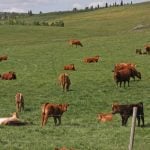Federal, provincial and territorial (FPT) ministers of agriculture are scheduled to meet Nov. 20 and 27 to discuss improving business risk management (BRM) programs.
Federal Agriculture Minister Marie Claude Bibeau said she is confident counterparts from Quebec, Ontario and British Columbia will be willing to contribute their share to make significant improvements to AgriStability, the program most criticized by producers.
“It’s going to be more challenging with the Prairie provinces and some other provinces, who are saying that they have more financial or fiscal constraints,” she said.
Read Also

B.C. farmers to receive increased AgriStability supports
B.C. farmers to receive bump in AgriStability compensations due to weather concerns, international trade instability
BRM programs are funded by federal and provincial governments, at a cost-share ratio of 60-40. The cost has averaged roughly $1.5 billion in the past five years, but is expected to be higher this year because of the pandemic.
Consecutive years of strong commodity prices justified governments moving money away from risk management funding toward other programs, such as those focusing on innovation. By 2013, policy adjustments had made AgriStability more difficult for farmers to qualify for what became relatively lower payouts.
Now producers are calling for AgriStability to pay out at pre-2013 levels, and for the removal of its reference margin limits so it’s easier for producers to qualify.
Bibeau says her objective is to find consensus among the provinces to “make AgriStability more generous, easier to understand and to proceed with, and also fairer when we look at the different sectors in agriculture.”
She said she is confident in being able to accomplish it, but admits it won’t be easy.
“I still have to finalize my work at my own level, to get the authority to make changes that I’m looking for, and it will be obviously, for all of us, a matter of the financial capacity,” she said.
And while Ottawa knows there are a few levers it can play with — such as the compensation rate, payment triggers and the annual cap on payouts — Bibeau said “we all already agree on the fact that removing the reference margin limit should be the first step.”
Doing so is considered to be the most palatable option across government, largely because it is the least expensive option. Such a move may appease some producer groups, but others, such as pork or cattle producers, will want more substantive changes.
Cow-calf producers, for one example, have low eligible expenses, in part because they often produce their own feed and have low labour costs, so their margins must drop farther than other commodities before triggering payments from the program.
Bibeau maintains “all the options are still on the table” but said all the analysis done internally and externally shows “the best first step in the right direction” is to remove the reference margin cap.
In March, Agriculture and Agri-Food Canada officials confirmed lowering the threshold to qualify and raising the total amount that can be paid out under AgriStability were also options being considered.
While the agenda for the ministers’ meeting was still being finalized as of this writing, it’s expected the provinces will also receive an update on the status of international trade and discuss other issues pressing the agricultural sector, such as the potential threat of African swine fever (ASF).
Originally scheduled for July, the COVID-19 pandemic prompted the FPT meetings to be pushed to October. An election in Saskatchewan further delayed the meetings to the November dates.
During their last round of meetings, which took place in December 2019, the ministers agreed on making only minor changes to BRM programming.
— D.C. Fraser reports for Glacier FarmMedia from Ottawa.
















